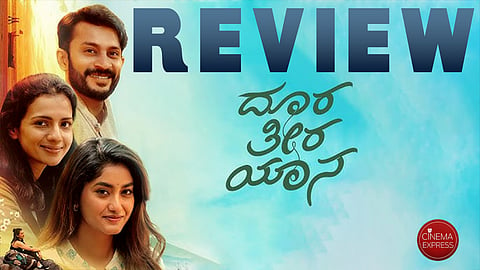Doora Theera Yaana Movie Review: A meditative leap into the emotional landscape of modern love
Doora Theera Yaana (3 / 5)
With Doora Theera Yaana, director Mansore offers not just a film, but a conversation; one that quietly unpacks what it truly means to love, to disagree, to travel together, and maybe, just maybe, to part peacefully. It’s an intimate and daringly quiet piece of cinema from a director best known for hard-hitting social stories (Harivu, Act 1978, and a thematic cousin to his Nathicharami), though far more atmospheric, introspective, and free-floating.
Here, Mansore trades the rigid frameworks of societal drama for the ever-shifting terrain of the heart. Yet, it’s no less insightful, perhaps even more so. One could say this is Mansore’s most personal work yet, not because it's life-based, but because it is emotionally universal. It reflects the realities of many modern couples, people trying to love each other across very real differences in temperament, vision, and desire. It’s a portrait of two kinds of people: those who believe love is about growing together through compromise, and those who understand that sometimes the most compassionate thing is to let each other go.
Director: Mansore
Cast: Vijay Krishna, Priyanka Kumar, Sruthi Hariharan and Sharath Lohitashwa
At the centre of this journey are Vijay Krishna as Akash and Priyanka Kumar as Bhoomi, who deliver not just believable performances, but lived-in characters. Akash has a warm impulsiveness — he’s a techie, yes, but also a dreamer, a part-time musician, someone who thrives in spontaneity and open skies. His affection is real, his care palpable. However, so is his boyish resistance to structure. Vijay Krishna captures this paradox delicately, a man who wants to be understood more than he wants to understand.
Priyanka Kumar, on the other hand, also a techie, is revelatory as Bhoomi. Her stillness is powerful. Her need for clarity, for rhythm in life, comes not from rigidity, but from lived grief — a woman shaped by the silence of a father, and the absence of a mother. She needs space, but not distance. She needs connection, but not chaos. Priyanka’s performance is layered with quiet hurt, guarded hope, and restrained warmth. The chemistry between them doesn’t explode, it simmers, hesitates, tests the water. It’s real.
Mansore builds this emotional geography slowly. Through everyday moments, a jam session with friends, a beachside disagreement, a late-night talk, the very fact that the two have different tastes, right from having coffee and tea, he explores how love reveals itself in the tiniest fractures. Their week-long trip becomes a metaphorical journey: not toward each other, but toward truth in relationship. What begins as a celebratory escape becomes a mirror. And that mirror reflects everything... joy, resentment, fatigue, fear, and an aching desire to just be seen for who one is.
Along the way, they meet people who serve as emotional signposts. (Sharath Lohitashwa and Sudha Belawadi) — a couple who, after 32 years of marriage, are now living peacefully in a live-in arrangement post-divorce — offer a quietly radical idea: that commitment can transform, and still survive. “We are no longer married,” they say, “but we still care.” In contrast, Akash and Bhoomi also meet Gowri (Sruthi Hariharan), a woman from Nathicharami’s world, who returns as a thoughtful voice on modern womanhood. She challenges Bhoomi’s ideas of marriage, reminding her that commitment must be a choice, not a burden of tradition. These conversations aren’t forced, they arise organically, like strangers one meets while travelling, who unexpectedly change your worldview despite confused beginnings; this is love post-definition, tender, boundary-less, and self-aware.
Elsewhere, Krishna Hebbar makes a brief appearance as a loner living amid nature, detached from the noise of cities and people. His solitude isn’t sad; it’s a choice. His moments reflect another truth: sometimes life offers clarity only when you're alone with yourself, stripped of relationships that blur identity. His interactions with Bhoomi, who is herself caught between social expectations and emotional intuition, gently nudge her toward self-discovery.
Mansore’s direction in Doora Theera Yaana is patient, unhurried, and deeply poetic. He doesn't impose drama; he invites introspection. The narrative isn't plotted in beats — it's mapped in feelings. There’s no villain, no grand conflict, no melodrama — only the bittersweet ache of two people trying to belong to each other while holding on to themselves. He seems to draw not just from cinematic craft, but from real-life conversations — of friends, acquaintances, and perhaps, even personal history. His gaze is neither judgmental nor sentimental. It is observant, compassionate, and occasionally philosophical.
The film's aesthetic mirrors its emotional texture. Long shots by the sea, unplanned pit stops, brief musical interludes — they all evoke a sense of searching. Music, especially, plays a critical role. The first song, “Naanu Kolike Ranga,” bursts with the casual joy of friendship and young love. Later, in Goa, when Akash’s musical dream unexpectedly becomes reality — thanks to Bhoomi’s quiet support, it becomes clear: she may not always agree with him, but she believes in him. Sometimes, that’s what love is — not agreement, but encouragement.
Yet, the question lingers: Can they build a life together, or will their differences eventually consume the connection? The film doesn’t offer answers — only understanding. Because sometimes, love is not about winning or losing, staying or leaving, but about arriving at a place of mutual respect. And if that place is not the same for both, then parting is not failure, it’s grace.
Doora Theera Yaana is a film that listens, observes, and meditates. Vijay Krishna and Priyanka Kumar deliver emotionally precise performances that make you feel like you’re watching real people, not characters. And Mansore, in his signature styl,e proves that cinema is most powerful when it is honest, tender, and rooted in truth.

